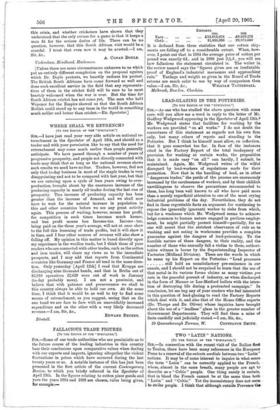LEAD-GLAZING IN THE POTTERIES.
[To THE EDITOR OF THE "SPECTATOR:'] SIR,—As one who has studied the above question with some care, will you allow me a word in reply to the letter of Mr. Godfrey Wedgwood appearing in the Spectator of April 13th ? Air. Wedgwood states that facilities for washing by the workers are provided "on all works." I do not doubt-the correctness of this statement as regards not his own firm only, but many others of repute and standing in the Potteries. But I think he himself must allow, on reflection, that it goes somewhat too far. In face of the instances cited in the Factory Report of the total inadequacy of provision for washing at* certain works, the propoeition that it is made easy "on all" can hardly, I submit, be maintained. Again, Mr. Wedgwood writes of the wilful disregard by lead-workers of regulations made for their protection. Now that in the handling of lead, as in other " dangerous trades," the perils of the process are enormously increased by the carelessness of workers, and by their childish unwillingness to observe the precautions recommended to them, has long been well known to all who have paid more than a merely superficial attention to one of the most crying industrial problems of the day. Nevertheless, they do not find in these regrettable facts an argument for continuing to expose the (generally ignorant) worker to risks from which, but for a weakness which Mr. Wedgwood seems to acknow- ledge common to human nature engaged in perilous employ- ment, he might partially protect himself—partially, for no one will assert that the strictest observance of rule as to washing and not eating in workrooms provides a complete guarantee against the dangers of lead-poisoning. To the horrible nature of these dangers, to their reality, and the number of those who annually fall a victim to them, authori- tative witness is borne by the Superintending Inspector of Factories (Midland Division). These are the words in which he sums up his Report on the Potteries: "Lead processes still hold an unsatisfactory pre-eminence in our annals, and I should not be surprised to learn that the use of that metal in its various forms claims as many victims pro rata in the peaceful pursuit of industry, as when discharged in the form of Mauser or Lee-Metford bullets with the inten- tion of destroying life during a protracted campaign." In conclusion, let me beg any of your readers who feel interested in this question of lead-glazing to read the Factory Reports which deal with it, and also that of the Home- Office experts (Dr. Thorpe and Dr. Oliver) whose inquiries have brought about the use of a " leadless " glaze in the greater number of Government Departments. They will find them a mine of facts candidly and judicially stated.—I am, Sir, &c., 89 Queensborough, Terrace, W. CONSTANCE SMITH.






































 Previous page
Previous page